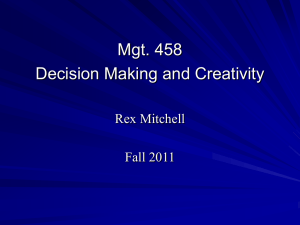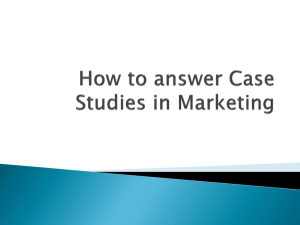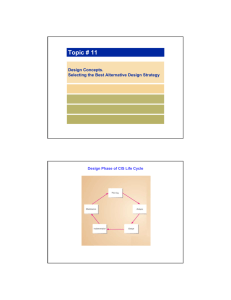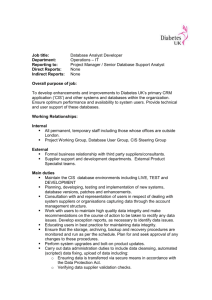Misc charts
advertisement
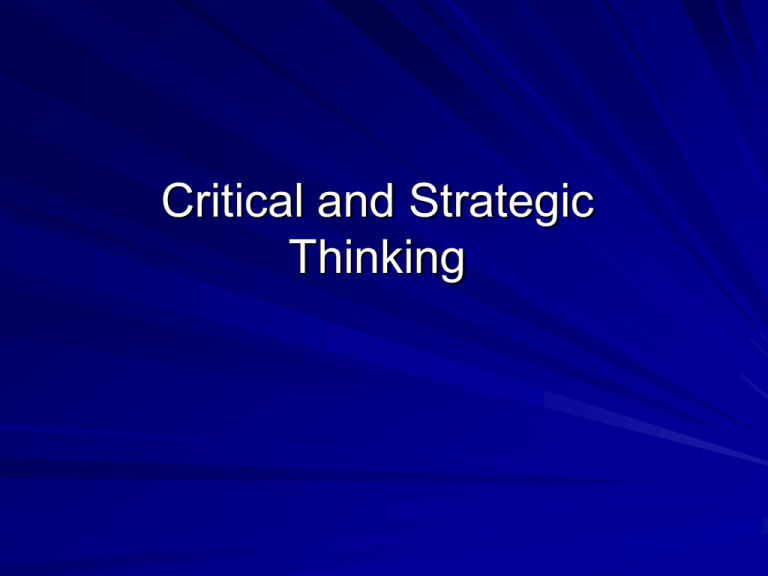
Critical and Strategic Thinking Browne & Keeley’s Cr.Th. Q’s 1. What are the issues and the conclusions? 2. What are the reasons supporting the conclusions? 3. Which words or phrases are ambiguous? 4. What are the value conflicts and assumptions about value priorities? 5. What are the descriptive assumptions? 6. How good is the evidence? 7. What significant information is omitted? 8. Are the statistics deceptive or misleading? 9. Are there any fallacies in the reasoning? 10.Are there rival causes, i.e., other explanations or interpretations of the evidence or these findings? 11.What other reasonable conclusions are possible? Some Un-critical Thinking Heavier-than-air flying machines are impossible. – Lord Kelvin-British mathematician, physicist, and president of the British Royal Society, c. 1895. A severe depression like that of 1920-21 is outside the range of probability. – Harvard Economic Society-Weekly Letter November 16, 1929 More Un-critical Thinking Gone with the Wind is going to be the biggest flop in Hollywood history. – Gary Cooper, 1937, after turning down the role of Rhett Butler They couldn't hit an elephant at this dist_____ – General John B. Sedgwick-Union Army Civil War officer's last words, uttered during the Battle of Spotsylvania, 1864 Some Common Fallacies 1. 2. 3. 4. 5. 6. 7. 8. 9. 10. 11. 12. 13. 14. 15. 16. 17. 18. 19. 20. Slippery Slope: assuming that a proposed step will set off an uncontrollable chain of undesirable events Searching for Perfect Solution: unwilling to solve part of a problem Equivocation: using a key word with two or more meanings in an argument Appeal to Popularity : falsely assumes that something favored by a large group is desirable Appeal to Questionable Authority: citing an authority who lacks special expertise on the issue at hand Appeals to Emotions: using emotionally charged language to distract from relevant reasons and evidence Straw Person: Distorting one’s opponent’s point of view so that is it easy to attack Attacks: Attacks a person or a person’s background, instead of the person’s ideas Either-Or: assuming only two alternatives Wishful Thinking: assuming that, because we wish X were true or false, then X is indeed true or false Explaining by Naming: assuming that a name for some event or behavior adequately explained the event Glittering Generality: Use of vague emotionally appealing virtue words Red Herring: An irrelevant topic is presented to divert attention from the original issue Begging the Question: an argument in which the conclusion is assumed in the reasoning. Hasty Generalization: drawing a conclusion about a large group based on experiences with only a few members Faulty Analogy: using an analogy in which there are important relevant dissimilarities Causal Oversimplification: explaining an event by relying on causal factors that are insufficient… Confusion of Cause and Effect: confusing the cause with the effect of an event Neglect of a Common Cause: failure to recognize that two events may be related because of a 3rd factor Post Hoc: assuming that a particular event, B, is caused by another event, A, simply because B follows A in time. The Socialist Democrat Establishment of America wants to shut Pro-American Voices Up! (2008, on a tee-shirt, with this capitalization) The history of forcing fluoride on humans through the fluoridation of drinking water is wrought with lies, greed and deception. Governments that add fluoride to drinking water supplies insist that it is safe, beneficial and necessary, however, scientific evidence shows that fluoride is not safe to ingest… The lies of the benefits of water fluoridation will continue to be fed to the public, not to encourage health benefits to a large number of people, but to profit the military-industrial complex. (2007) The number one economic threat to our nation and our well-being is the price of a gallon of gas. We as individuals and our nation are at risk. We have watched the price of gas sharply increase and to this day our Congress has done nothing or even indicated they have a plan. The quickest and most helpful thing Congress can do to reduce the price of gas right now is to lift the moratorium on drilling for oil in the U.S. and offshore. Drilling offshore can be done safely now! Other nations are doing it now! (2008) Strategic Thinking 1. Identify & focus on important issues 2. Select key, relevant information 3. Recognize systemic properties 4. Understand through: – Distinguishing causes from effects – Clarifying (tacit) underlying assumptions – Considering issue in a larger context – Maintaining a long-term view Strategic Thinking (cont.) 5. Appreciate implications & consequences 6. Generate alternatives & evaluate objectively 7. Integrate logical/rational & creative/generative thinking 8. Remain flexible 9. Act in the face of emotional discomfort Strategic Thinking (1 page) 1. Identify & focus on important issues 2. Select key, relevant information 3. Recognize systemic properties 4. Understand through: – – – – Distinguishing causes from effects or symptoms Clarifying (often tacit) underlying assumptions Considering the issue or situation in a larger context Maintaining a long-term view 5. Appreciate implications & consequences 6. Generate alternatives & evaluate objectively 7. Integrate logical/rational & creative/generative thinking 8. Remain flexible 9. Act in the face of emotional discomfort Another View of Strategic Thinking Thinking more deeply to distinguish underlying causes and issues from more obvious symptoms Thinking more broadly to recognize systemic linkages, interactions, and patterns Thinking long-term as well as short-term about implications and consequences Strategic Thinking Case Apply strategic thinking to the case, making notes for yourself Discuss in groups Report out with total class discussion Southwest Airlines Strategies Be a short-haul niche player (initially) Fly frequently between pairs of cities not too far apart (not hub-and-spoke system) Use uncongested secondary airports Fly only one type of aircraft (737 family) SW Strategies (cont.) Fierce cost controls & no frills (no assigned seats, no onboard food, direct ticket sales, ticketless travel) Differentiate through focus on operations, service, people, culture Foster good labor-management relations Expand later, including in East Aggressive fuel hedging Southwest Airlines Performance Started 1971 Profitable in 1973 and 36 consecutive years since Only one of top ten profitable after 9/11 2001-2005: $2.1 B profit while ten largest lost $59 B 2008: # 267, $11 B sales, $178 M profit while ten largest lost $4 B Highest market cap of any airline 64 cities in 32 states 481 planes (various 737 versions) Strike-free after 36 years of operations High on Fortune’s “best to work for” lists and various lists re customer satisfaction S&P report 7/22/09 said: We believe LUV is the financially strongest U.S. airline. It has posted 36 consecutive years of profitable operations, and we see the quality of those earnings as high. In addition, LUV has ample cash, and its debt to total capitalization is significantly below peer levels, by our analysis. We think these measures warrant a premium valuation to peers and the S&P 500. Strategic Management Process Strategic Management Process DIAGNOSIS FORMULATION IMPLEMENTATION Question Where are we (the Where do we org. in context of need/want to go? its environment)? How do we get there? Output Successful implementation (implementation plan, for this course) Set of critical issues (CIs) plus understanding... Strategy-level recommendations to ensure success & address the critical issues St. Mgt. Process: Diagnosis Identify & critique current mission, objectives, & strategies Analyze external & internal environments to evaluate performance plus identify SWOT & CIs External: competitive environment (5-force model) + societal environment (political/legal, technological, economic, sociocultural) + stakeholders Process: Diagnosis (cont.) Internal functional areas: financial; marketing; production/operations; technology; organizational No set protocol. Do what is necessary to understand & develop CIs. Analysis is a means to this end Both immediate and long-range problems. ID causes rather than symptoms Process: Formulation Formulate rich range of alternatives Evaluate alternatives Select a set Need clear recommendations with supporting justification May revise mission, objectives, strategies Three levels of recommendations: corporate, competitive, and "other" Process: Formulation (cont.) Recommendations should be: – Effective in solving problems – Practical – Feasible – Cost-effective – Acceptable to key stakeholders Is vital to ensure that all CIs have been addressed adequately Process: Implementation Plan is a set of basic action steps addressing: what, how, who, where, when & why - is necessary to make the strategy work Resources (financial, human, physical, technological) Obtaining & maintaining support for changes Reward systems Timing (especially sequencing & constraints) Organization structure Tracking & control systems Leadership, managing change Strategic Management Process DIAGNOSIS FORMULATION IMPLEMENTATION Question Where are we (the Where do we org. in context of need/want to go? its environment)? How do we get there? Output Successful implementation (implementation plan, for this course) Set of critical issues (CIs) plus understanding... Strategy-level recommendations to ensure success & address the critical issues

